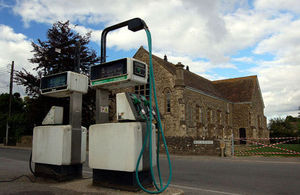Fuel rebate extension plans to remote inland areas take step forward
Fuel retailers in rural areas asked to let the government know how much they charge for petrol and diesel.

Fuel retailers in remote areas of the UK are being asked to let the government know how much they charge for petrol and diesel as the government prepares to seek permission from the European Commission to extend the island fuel rebate scheme, Chief Secretary to the Treasury Danny Alexander has said.
The move could see a fuel rebate extended to other remote rural areas of the UK with higher fuel costs.
Nearly 1,500 retailers in 36 counties and districts in England, Wales, Scotland and Northern Ireland are being consulted.
An expanded scheme will require approval from the Commission and other Member States. The government aims to submit an application and evidence base in support of the scheme expansion over the autumn.
Chief Secretary to the Treasury Danny Alexander said:
The island fuel rebate provides much needed help to keep down fuel prices in areas where costs of transporting fuel mean prices are much higher. I know that there are other remote rural areas of the UK with similarly high fuel costs.
So we are today starting to gather further evidence that will form part of an application to the Commission to extend the island fuel duty discount scheme to very remote rural areas.
We will need to prove that there are areas which are similar to the islands in terms of pump prices and distribution costs, so I would urge local areas that may qualify to provide the information we need to make the case as robust as possible.
He added:
As a Highlander, I know that for people who live in rural areas driving is not a choice, but a necessity. So while it won’t be easy to get this agreed with the Commission, I want to do everything I can to make this happen.
The current rebate scheme allows retailers of road fuel within the Inner and Outer Hebrides, the Northern Isles, the Islands of the Clyde and the Isles of Scilly to register with HM Revenue & Customs (HMRC) to claim back five pence per litre (ppl) relief on unleaded petrol and diesel for retail sale within the eligible areas.
Fuel retailers in some counties and districts (detailed below) are being invited to supply pump price data along with verifiable records for Q4 2012.
| Aberdeenshire | Cookstown | Herefordshire | Newry and Mourne |
| Angus | Cornwall | Highland | North Yorkshire |
| Antrim | Cumbria | Isle of Anglesey | Northumberland |
| Argyll and Bute | Devon | Larne | Omagh |
| Armagh | Down | Limavady | Perth and Kinross |
| Ballymena | Dumfries and Galloway | Magherafelt | Powys |
| Ballymoney | Dungannon | Monmouthshire | Scottish Borders |
| Banbridge | Fermanagh | Moray | South Ayrshire |
| Coleraine | Gwynedd | Moyle | Strabane |
The data will expand the government’s evidence base to support the expansion of the fuel rebate to rural communities in other areas of the UK with similar cost characteristics to the islands in the current scheme.
The government is therefore most interested in identifying areas were prices were consistently similar to those on the islands (set out in the table below). Areas where prices were consistently below these levels are extremely unlikely to be included in the extension.
| October 2012 | November 2012 | December 2012 | |
|---|---|---|---|
| Ordinary unleaded | 144 ppl | 143 ppl | 139 ppl |
| Diesel | 148.5 ppl | 148 ppl | 145.5 ppl |
Under the current Island rebate scheme, retailers of road fuel within the areas concerned can register with HMRC to claim five ppl relief on fuel purchased on or after 1 January 2012 for onward retail sale in the Inner and Outer Hebrides, the Northern Isles, the Islands of the Clyde and the Isles of Scilly.
Retailers can make claims on a monthly basis and have 60 days following registration to reduce the cost of every litre of road fuel sold by the equivalent amount of the relief claimed.
This is so that all consumers in the areas concerned benefit from the reduction in fuel duty. The 60 day period during which retailers are not required to pass on the relief is designed to help avoid initial cash flow problems.
To enact the current scheme the government needed EU agreement. This is because any discount on the standard rate of fuel duty requires a derogation from the EU Energy Tax Directive. The government will also need European clearance for the extension of the scheme.
Photo by Joe Dunckley on Flickr. Used under creative commons.
Updates to this page
-
added link to Call for information
-
First published.